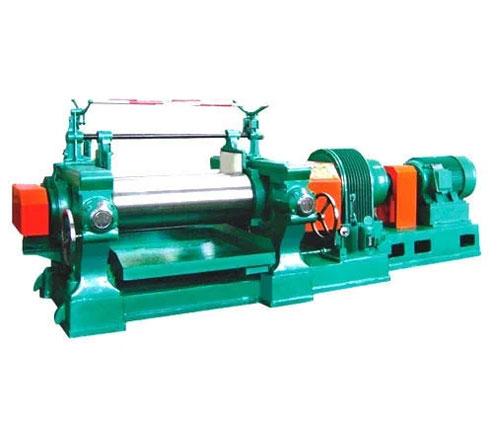Top Innovations Introduced by Rubber Mixing Mill Machine Manufacturers in Delhi

Delhi-based rubber machinery manufacturers are no longer just producing traditional two-roll mills — they are increasingly innovating to stay competitive, address modern rubber processing challenges, and meet global demand. Let’s explore some of the top innovations that manufacturers in Delhi are bringing to the table in their rubber mixing mill machines.
1. Automated Roll Speed and Nip Adjustment
One of the key upgrades by leading Delhi manufacturers (like Uttam Rubtech) is the inclusion of automated speed and nip adjustment. Instead of manually tuning the roller gap or speed for every batch, modern mills now come with motorized systems controlled via PLC or HMI panels. This not only reduces setup time but also ensures more consistent mixing for every batch, particularly useful when switching between different rubber compounds.
2. Integrated Digital Temperature Control
Temperature monitoring and control are critical in rubber mixing. Several Delhi manufacturers are now embedding digital temperature sensors and feedback loops in their mills — enabling real-time adjustments to keep the rolls within optimal temperature ranges. This innovation reduces the chances of overheating and ensures that the elastomer mix attains uniform thermal properties.
3. Energy-Efficient Drive Systems
To meet rising energy cost pressures, Delhi-based producers are shifting to variable-frequency drives (VFDs) or more efficient motor-gearbox systems. For instance, mill machines from Uttam Rubtech deploy optimized power transmission systems to deliver high torque without excessive power draw.
4. Smart Safety Features
Safety is a big focus in modern mill design. Delhi manufacturers are embedding advanced interlocks, emergency stop mechanisms, and overload protection systems. These features help prevent accidents during roll tilting or when a material jam occurs. As rubber mills handle very high shear forces, such innovations significantly enhance workplace safety.
5. Real-Time Monitoring & Remote Diagnostics
Taking a page from Industry 4.0, some manufacturers in Delhi are now offering real-time machine data monitoring — tracking variables like roll temperature, motor current, and torque. More advanced models even support remote diagnostics, allowing maintenance teams to identify potential issues (like bearing wear or imbalance) before they lead to a breakdown. This predictive maintenance capability helps minimize downtime.
6. Modular Mill Design for Flexible Production
Flexibility is increasingly important for rubber factories that produce multiple compound types. To cater to this, rubber mixing mill manufacturers in Delhi (such as Ravi Machine Works) are adopting modular designs. These allow clients to easily switch rollers, change nip settings, or upgrade control panels without buying a completely new machine.
7. Environmentally Friendly Build Materials
Sustainable manufacturing is another trend. Some Delhi manufacturers are using high-grade alloy steel rollers and corrosion-resistant materials that last longer, reducing the need for frequent replacement. Paired with efficient insulation and heat control systems, this leads to less material waste and a smaller environmental footprint.
8. User-Friendly Interfaces & Training Tools
User interfaces are evolving rapidly. Modern mixing mills built in Delhi often feature touchscreen HMIs (Human-Machine Interfaces), which simplify control over mill parameters like speed, temperature, and nip gap. These systems sometimes come with built-in tutorials, error logs, and help menus, making training easier for operators. This improves process control and reduces user error.
9. Hybrid Automation: Semi-Automatic with Manual Override
Recognizing that not all rubber compounding operations require full automation, many Delhi manufacturers are offering hybrid machines. These combine semi-automatic features — such as automatic heating and nip adjustment — with manual override capabilities. This gives operators full control when fine-tuning complex formulations or working with new materials.
10. Compact, Laboratory-Scale Mills
To support R&D and small-batch production, Delhi manufacturers are increasingly producing compact, lab-scale mixing mills. These small yet powerful machines are designed for experimentation, pilot runs, and formula validation. They often include precision controls, safety interlocks, and easy access for ingredient feeding — making them ideal for quality labs and development units.
Why These Innovations Matter
-
Better Quality & Consistency: Automation and temperature control ensure each batch is identical, improving product reliability.
-
Efficiency Gains: Energy-efficient motors and optimized designs lower running costs and boost throughput.
-
Reduced Downtime: Remote diagnostics and modular builds allow quicker maintenance and less unplanned downtime.
-
Safer Workplace: Advanced safety features protect workers and reduce risk.
-
Flexibility: Modular and hybrid mills let manufacturers adapt rapidly to changing production demands or new compound formulations.
Conclusion
Rubber mixing mill machine manufacturers in Delhi are no longer just making basic two-roll mills — they’re innovating deeply to meet modern industry demands. From smart sensors and automation to energy-efficient drives and compact designs, these innovations are helping Indian rubber processing plants stay competitive, sustainable, and future-ready.
- AI
- Vitamins
- Health
- Admin/office jobs
- News
- Art
- Causes
- Crafts
- Dance
- Drinks
- Film
- Fitness
- Food
- Spellen
- Gardening
- Health
- Home
- Literature
- Music
- Networking
- Other
- Party
- Religion
- Shopping
- Sports
- Theater
- Wellness


